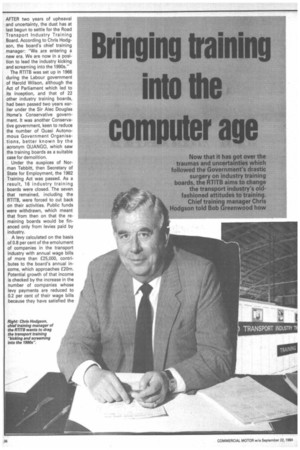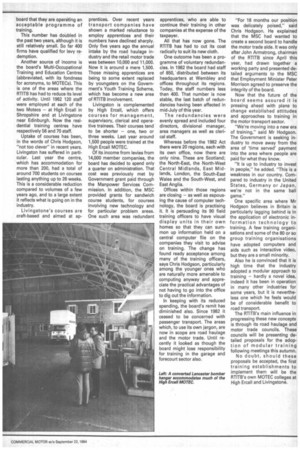AFTER two years of upheaval and uncertainty, the dust has
Page 38

Page 39

If you've noticed an error in this article please click here to report it so we can fix it.
at last begun to settle for the Road Transport Industry Training Board. According to Chris Hodgson, the board's chief training manager: "We are entering a new era. We are now in a position to lead the industry kicking and screaming into the 1990s."
The RTITB was set up in 1966 during the Labour government of Harold Wilson, although the Act of Parliament which led to its inception, and that of 22 other industry training boards, had been passed two years earlier under the Sir Alec Douglas Home's Conservative government. It was another Conservative government, keen to reduce the number of Quasi Autonomous Government Organisations, better known by the acronym QUANGO, which saw the training boards as a suitable case for demolition.
Under the auspices of Norman Tebbitt, then Secretary of State for Employment, the 1982 Training Act was passed. As a result, 16 industry training boards were closed. The seven that remained, including the RTITB, were forced to cut back on their activities. Public funds were withdrawn, which meant that from then on that the remaining boards would be financed only from levies paid by industry.
A levy calculated on the basis of 0.8 per cent of the emolument of companies in the transport industry with annual wage bills of more than E25,000, contributes to the board's annual income, which approaches £20m. Potential growth of that income is checked by the increase in the number of companies whose levy payments are reduced to 0.2 per cent of their wage bills because they have satisfied the board that they are operating an acceptable programme of training.
This number has doubled in the past two years, although it is still relatively small. So far 400 firms have qualified for levy redemption.
Another source of income is the board's Multi-Occupational Training and Education Centres (abbreviated, with its fondness for acronyms, to MOTECs). This is one of the areas where the RTITB has had to reduce its level of activity. Until 1982 120 staff were employed at each of the two Motecs — at High Ercall in Shropshire and at Livingstone near Edinburgh. Now the residential training centres have respectively 56 and 70 staff.
Uptake of courses has been, in the words of Chris Hodgson, "not too clever" in recent years. Livingston has suffered in particular. Last year the centre, which has accommodation for more than 200, had a total of around 700 students on courses lasting anything up to 26 weeks. This is a considerable reduction compared to volumes of a few years ago, and to a large extent it reflects what is going on in the industry.
Livingstone's courses are craft-based and aimed at ap
prentices. Over recent years transport companies have shown a marked reluctance to employ apprentices and their numbers have declined sharply. Only five years ago the annual intake by the road haulage industry and the retail motor trade was between 10,000 and 11,000. Now it is around a mere 1,500. Those missing apprentices are being to some extent replaced by youngsters on the Government's Youth Training Scheme, which has become a new area of RTITB involvement.
Livingston is complemented by High Ercall, which offers courses for management, supervisory, clerical and operative trainees. Their courses tend to be shorter — one, two or three weeks. Last year around 1,500 people were trained at the High Ercall MOTEC.
Of its income from levies from 14,000 member companies, the board has decided to spend only a quarter on administration. That cost was previously met by Government grant paid through the Manpower Services Commission. In addition, the MSC provided grants for sandwich course students, for courses involving new technology and for particular problem areas. One such area was redundant apprentices, who are able to continue their training in other companies at the expense of the taxpayer.
All that has now gone. The RTITB has had to cut its coat radically to suit its new cloth.
One outcome has been a programme of voluntary redundancies. In 1982 the board had staff of 850, distributed between its headquarters at Wembley and offices throughout its regions. Today, the staff numbers less than 400. That number is now stable, the last batch of redundancies having been affected in mid-July of this year.
The redundancies were evenly spread and included four directors, divisional manager, area managers as well as clerical staff.
Whereas before the 1982 Act there were 20 regions, each with its own office, now there are only nine. These are Scotland; the North-East, the North-West Central Midlands, East Midlands, London, the South-East Wales and the South-West, and East Anglia.
Offices within those regions are closing — as well as espousing the cause of computer technology, the board is practising it. It is persuading its 90 field training officers to have visual display units in their own homes so that they can summon up information held on a central computer file on the companies they visit to advise on training. The change has found ready acceptance among many of the training officers, says Chris Hodgson, particularly among the younger ones who are naturally more amenable to computing anyway and appreciate the practical advantages of not having to go into the office to dig out the information.
In keeping with its reduced spending, the board's remit has diminished also. Since 1982 it ceased to be concerned with passenger transport. The areas which, to use its own jargon, are now in scope are road haulage and the motor trade. Until recently it looked as though the board might lose responsibility for training in the garage and forecourt sector also. "For 18 months our position was delicately poised," said Chris Hodgson. He explained that the MSC had wanted to create a second board to handle the motor trade side. It was only after John Armstrong, chairman of the RTITB since April this year, had drawn together a working party and presented detailed arguments to the MSC that Employment Minister Peter Morrison agreed to preserve the integrity of the board.
Now that the future of the board seems assured it is pressing ahead with plans to change established attitudes and approaches to training in the motor transport sector.
"We're moving into a new era of training," said Mr Hodgson. The Government is seeking industry to move away from the area of 'time served' payment into the area where people are paid for what they know.
"It is up to industry to invest in people," he added. "This is a weakness in our country. Compared to industry in the United States, Germany or Japan, we're not in the same ball game."
One specific area where Mr Hodgson believes in Britain is particularly lagging behind is in the application of electronic information technology to training. A few training organisations and some of the 80 or so group training organisations have adopted computers and aids such as interactive video, but they are a small minority.
Also he is convinced that it is high time that the industry adopted a modular approach to training — hardly a novel idea, indeed it has been in operation in many other industries for some years, but it is nevertheless one which he feels would be of considerable benefit to road transport.
The RTITB's main influence in progressing these new concepts is through its road haulage and motor trade councils. These councils will be presenting detailed proposals for the adoption of modular training following meetings this autumn.
No doubt, should these proposals be accepted, the first training establishments to implement them will be the RTITB's own MOTEC colleges at High Ercall and Livingstone.




























































































